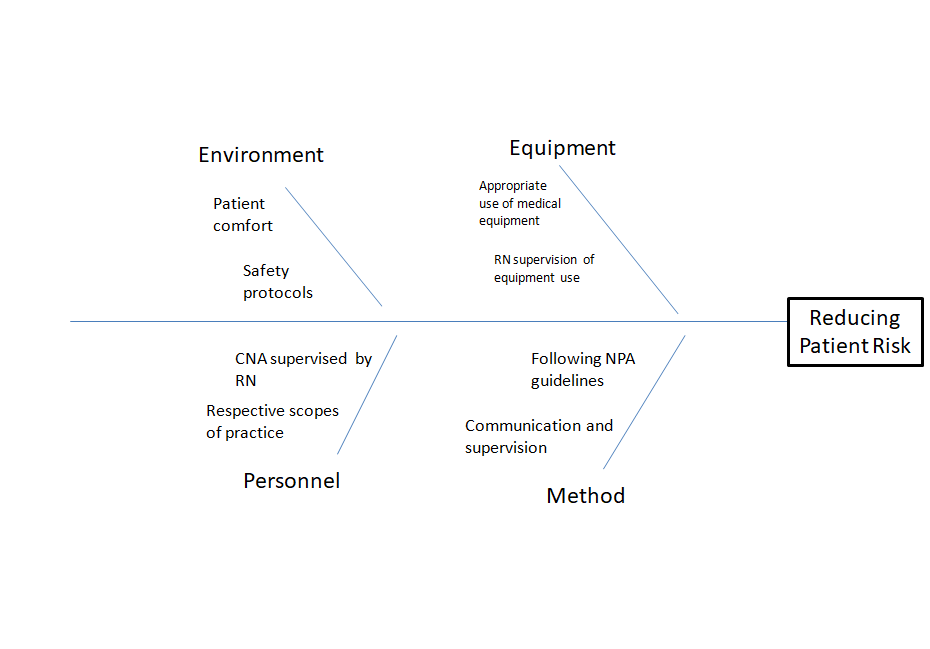The self-identified delegation scenario includes the RN (registered nurse) delegating the task of performing a fingerstick glucose test on the post-operative patient before receiving food to a CNA (certified nursing assistant). The delegation process is justified under the Texas Board of Nursing Rule 225.12. The key players in the delegation scenario include the registered nurse and the certified nursing assistant, as well as the patient. Hence, the selected task could be delegated under the Delegation of Insulin or Other Injectable Medications Prescribed in the Treatment of Diabetes Mellitus section of the Texas Board of Nursing Rule. The certified nursing assistant’s scope of practice includes basic care procedures such as bathing and personal hygiene (Roberts et al., 2019). In the case of strict supervision by the registered nurse, a certified nursing assistant may conduct basic procedures related to injectable medications. Measuring the patient’s glucose level is a low-risk task delegated to a certified nursing assistant. The task does not require the nursing assistant to formulate a care plan or calculate the dose (nonapplicable), as treating a patient with diabetes would require.
The main factors that support the registered nurse’s decision to delegate the task include stability and low-risk level of the patient’s health state and the nurse’s right to accept all responsibility for the consequences of the task. The CNA’s availability is another critical factor to consider while noting the RN’s busy schedule and other procedures that require their competency. CNAs are usually present in more significant numbers than registered nurses in medical institutions due to a lower level of training and scope of practice (Davidson & Szanton, 2020). As previously mentioned, their scope of practice includes basic healthcare procedures related to the patient’s hygiene and comfort. However, they may perform a fingerstick glucose test on a patient before receiving food under the Texas Board of Nursing Rule 225.12. Overall, their availability and basic scope of practice allow a registered nurse to delegate safe tasks in stable conditions.
The Nurse Practice Act guidelines suggest distinguishing between nurses on the basis of special training, which can be identified in the way a certified nursing assistant was chosen for delegation based on their scope of practice. Moreover, the Nurse Practice Act emphasizes the RN’s role as a healthcare professional with various opportunities to supervise their subordinates in the appropriate conditions due to their license status.
The proper delegation included ensuring a stable state of the patient, the CNA’s competency and skills, communication with the patient, and supervision by the RN. Such proper delegation reduced patient risks, for example, the increase of blood glucose levels before a meal, by ensuring the optimal environment for the patient and mutual understanding between the healthcare providers. Also, the patient’s health could be appropriately monitored by the RN while the CNA performed the fingerstick glucose test. Considering the post-operative state of the patient, it would be essential for the RN to focus on assessing the patient’s health and the following steps to take.
If the task had been delegated improperly, a lack of the chosen healthcare provider could lead to negative consequences for the patient’s health. For example, inadequate testing of the patient’s sugar levels could lead to an increase in glucose in the blood after receiving food. If not treated immediately, this could lead to further complications based on the patient’s medical history. Hughes-Gay et al. (2021) research highlighted the benefit of effective delegation when conducted appropriately. On the other hand, the worsening of the patient’s condition or the emergence of new symptoms would signify the importance of the RN consulting other professionals with the required training. In that case, a CNA would not be able to complete the task to avoid harmful patient care.
References
Davidson, P. M., & Szanton, S. L. (2020). Nursing homes and COVID-19: We can and should do better. Journal of Clinical Nursing, 29(15-16), 2758–2759. Web.
Hughes-Gay, M., Opsahl, A., Kirby, K., & DeGraff, J. (2021). An educational collaboration for student nurse engagement on the essential skill of delegation. Teaching and Learning in Nursing, 16(1), 63-67. Web.
Roberts, T. J., Nolet, K., & Bowers, B. (2019). Exploring variation in Certified Nursing Assistant assignments from the perspective of nursing home residents: A comparison of adopters and nonadopters of consistent assignment. Journal of Applied Gerontology, 38(11), 1583 1594. Web.
Appendix A
